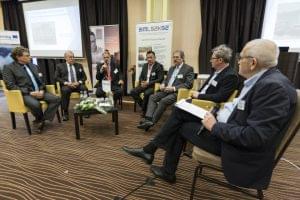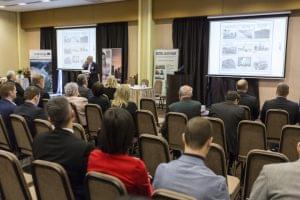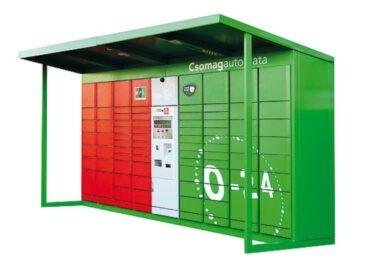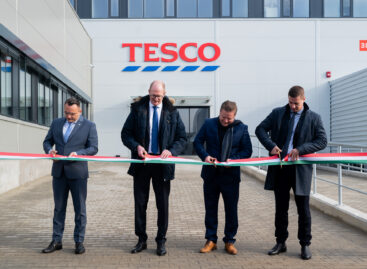Digitisation and automation are the future in logistics
In January the Association of Hungarian Logistics Service Centres (MLSZKSZ) organised the 9th International Transport Logistics Conference in Herceghalom. The keynote speaker was major general Károly Szabó, chief customs director of the National Tax and Customs Administration (NAV), who told that inspections by the authorities can play a role in increasing logistic competitiveness. NAV head of department Gábor Horváth told in connection with the Electronic Public Road Trade Control System (EKÁER) that freight forwarders have accepted the system by now. He added that the EKÁER system has been extended to freight above the 3.5-ton limit.
MLSZKSZ president Zsolt Fülöp expressed his opinion that certain European countries had introduced hidden market protection measures in international freight forwarding, putting market players from Hungary and Central and Eastern Europe in a disadvantageous position. He added that the situation of logistics service providers has also worsened because of the increase in warehouse building costs. Gábor Dittel, general secretary of NiT Hungary said: the road freight transport trade is fighting for survival. He mentioned that 50 percent of Hungarian goods aren’t taken abroad by Hungarian freight forwarders – and one of the reasons for this is Hungarian VAT rules.

Béla Szalma, president of the Hungarian Shipping Federation (MAHOSZ) told: although Hungarian ports are working very well and they receive sufficient funding for development purposes, the shipping sector is underfinanced. László Katona, president of MMV Magyar Magánvasút Zrt. spoke to participants about how Hungary’s railway infrastructure is developing nicely. However, there are certain regulations that create a competitive disadvantage for rail freight transport businesses. Dr Imre Kovács, president-CEO of Rail Cargo Hungaria Zrt. explained that despite the liberalisation of the European rail freight transport market 20 years ago, the market competition didn’t bring the desired results. On behalf of the government deputy secretary of state Andor Nándor Tóth was present, who told that they are open to suggestions and they will improve the regulatory framework wherever they can.
Dezső Tóth from Volvo Trucks gave a presentation about the automaton of vehicles. The objective of this is to make the work of drivers easier. He told that great progress has been made in this field, there are already systems where drivers don’t have to use their legs, arms, eyes, etc. Ádám Szabolcs Kiss, sales manager of Jungheinrich Hungária Kft. defined the concept of intralogistics. He called attention to the fact that automatic solutions have been available for a long time in this domain. The company offers a wide range of progressive intralogistic solutions. They even have a concept for a fully automatic warehouse. Mr Kiss believes that these solutions can make output more calculable and keep salary costs lower.

In his presentation Tamás Domonkos, CEO of TrucksOnTheMap – one of Hungary’s most promising logistics startups – spoke about trucks rolling 120 billion kilometres empty in the USA and the European Union every year. This can happen because freight transportation is organised using obsolete methods. The company’s solution makes it possible to decrease the proportion of empty runs to less than 30 percent. Zsombor Nagy, managing director of BirdieCar Electric Solutions called participants’ attention to the advantages of electric vehicles. He is of the opinion that electric vehicles can help a lot in cost-cutting for companies, at the same time also contributing to environmental protection.
László Kis, logistic director of trans-o-flex Hungary Kft. illustrated the dynamics of the sector’s expansion: data by GKI indicates that e-commerce sales reached HUF 427 billion in 2016, which is 5.2 percent of the country’s total retail turnover. The company’s sales revenue was almost HUF 6 billion last year. They deliver 30,000-35,000 parcels a day. Attila Somogyi, sales director of Logi-Store Kft. spoke about the workforce shortage in freight forwarding and warehousing. In his view automatic warehouses can be a solution to this problem. An automatic warehouse takes 10-12 months to build and it is rather costly. According to Dr Péter Würsching, head of leasing at Jones Lang LaSalle Kft., 117,000m² of new real estate entered the market in 2017. This constitutes a 55-percent growth in comparison with 2016. The expert calculates with the same expansion rate for 2018. //
Related news
Price increase at Magyar Posta: this is how much the most common postal services will cost in 2025
Magyar Posta’s goal remains to provide its services efficiently and…
Read more >Energy efficiency investments and climate protection measures are becoming impossible
Further amendments are needed to the energy efficiency law before…
Read more >Tesco’s new 100,000 square meter logistics center in Hungary has been opened
On November 27, CTP Hungary ceremoniously handed over Tesco Global…
Read more >Related news
Most major grocery chains will keep their stores open until noon on December 24th
Most of the large grocery chains will keep their stores…
Read more >Recognition of Consumer Protection Excellence: Honoring the Best of 2024
This year’s outstanding consumer protection officers and special award recipients…
Read more >The Joy of Giving! – SPAR stores collect non-perishable food for people in need
The Hungarian Maltese Charity Service and SPAR Hungary have launched…
Read more >








